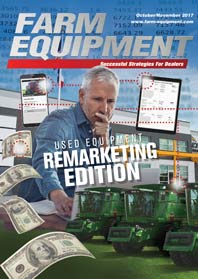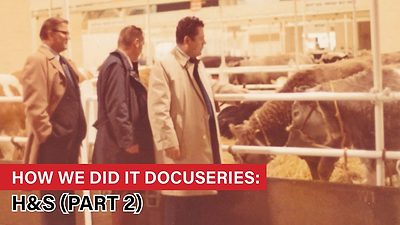Advertise Follow Us
Farm Equipment

View Archived Issues
October/November 2017
Volume: 55
Edition: 8
Used Equipment Remarketing Edition
-
Table of Contents
Table of Contents
2018 Dealer Business Outlook & TrendsDealers See Increasing Revenue Levels in 2018
If rising levels of optimism can be turned into equipment sales, dealers could have a good year ahead of them.Read More4 Steps to Turn Used Equipment Into Cashflow
Consultant Dr. Jim Weber urges dealers to buy smart, limit reconditioning, be attentive to sales mix and compensate sales on what matters most.Read MoreComparing Compensation Programs: Focus on What You Want
AgriVision (John Deere) and Livingston Machinery (AGCO) detail the compensation programs they’ve developed to keep attention on used equipment — and the actions they most want to drive.Read MoreH&R’s Valuation Process Minimizes The Risk That Comes With Trade-Ins
H&R Agri-Power has developed a proprietary app that guides its sales team through the trade-in process, ensuring all the necessary information is included to value it properly — quickly.Read MoreAre You Playing Football or Baseball With Your Trades?
Forrester Equipment & Butler Machinery share their approaches to bringing discipline into the valuation process for used machinery.Read MoreThe Washout Cycle — A Better Way to Manage & Sell Used Equipment
Casey Seymour swears by this strategy for managing used — and new — inventory for the best cashflow.Read MoreFor Success After the Trade-In, Preparation Trumps All
Customer transparency and equipment showcasing is key, but according to trade-in experts, most sales are won or lost before customers step into the dealership.Read MoreDifferentials for Mastering The Turnover Timetable
Just because a trade-in is only on Day 2 doesn’t mean you have to treat it that way.Read More -
Featured Articles
Featured Articles
2018 Dealer Business Outlook & TrendsDealers See Increasing Revenue Levels in 2018
If rising levels of optimism can be turned into equipment sales, dealers could have a good year ahead of them.Read More -
Online Extras
Online Extras




















